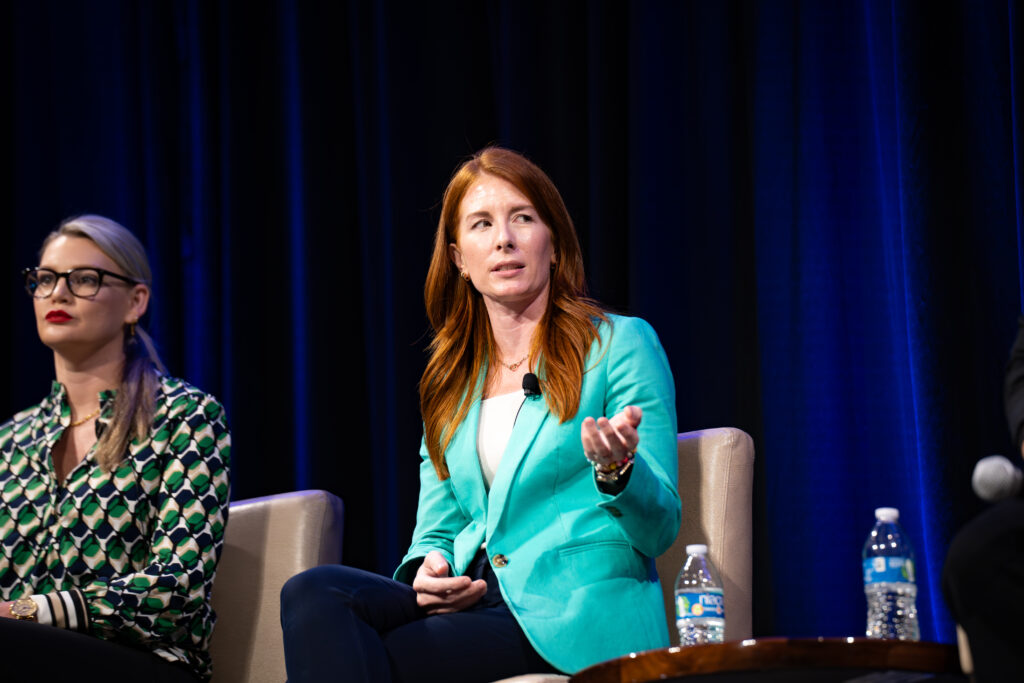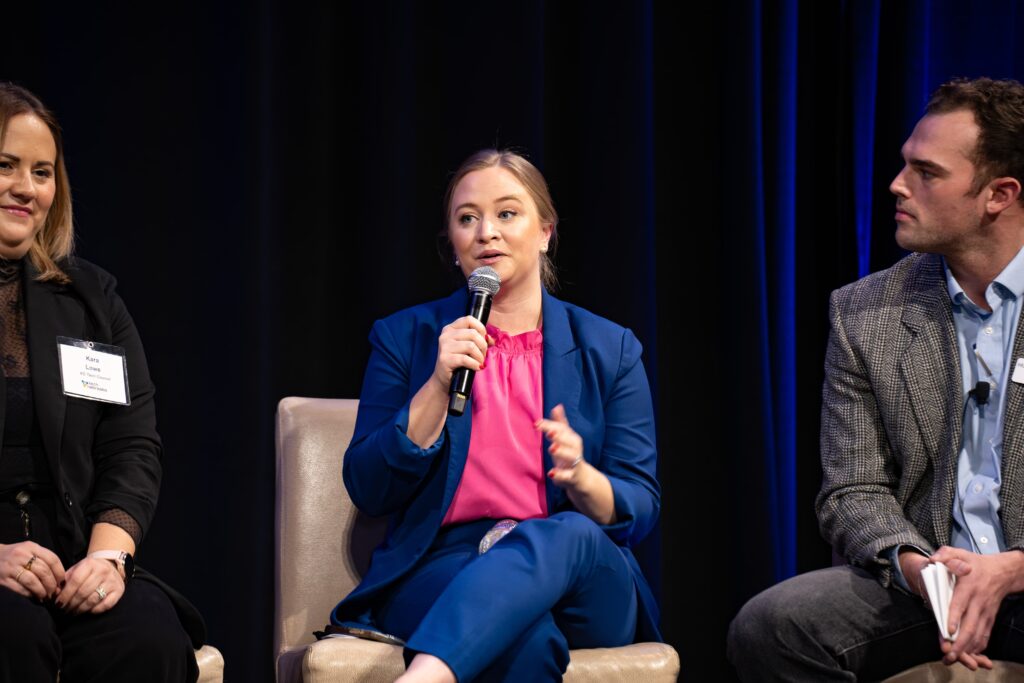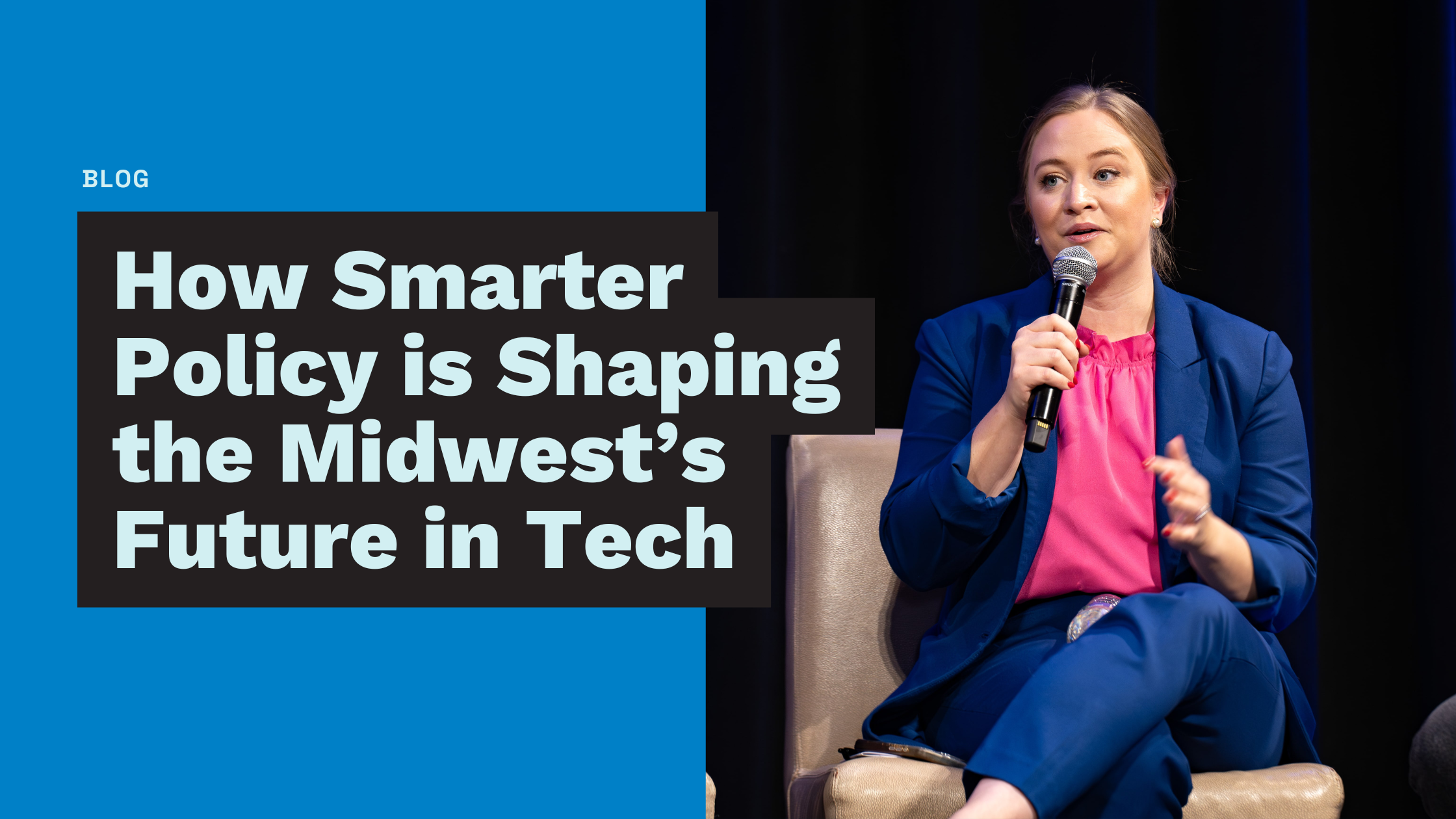Technology is advancing at breakneck speed across our region, country, and world, and policymakers everywhere are racing to keep up. From AI regulation to data privacy laws, the intersection of tech and policy is a balancing act: How can governments protect consumers and ensure responsible innovation without stifling progress?
To tackle this question, policy and industry leaders from across the Midwest weighed in:
- Laurel Oetken, Executive Director, Tech Nebraska
- Kara Lowe, CEO, KC Tech Council
- Mollie Ross, VP of Operations, Technology Association of Iowa
- Ruthie Barko, Executive Director, TechNet Colorado & Central U.S.
These experts discussed how smart legislation can fuel innovation, the challenges of regulating emerging technologies like AI, and the policies that are already making an impact. Their insights offer a roadmap for how the Midwest can shape a stronger tech future through collaboration, investment, and forward-thinking regulation.
The Power of Policy: How States Are Supporting Tech Growth
Tech policy isn’t just about regulation—it’s about creating the right environment for businesses to grow and innovate. By focusing on clear regulations, strong security frameworks, and a skilled workforce, policymakers can build a foundation that attracts investment and fuels tech-driven economies.
Laying the Groundwork with Strong Data Privacy Laws
With no federal data privacy law in place, states are stepping up to establish their own frameworks—helping businesses navigate compliance while protecting consumers.
“Nebraska should be proud of its data privacy legislation,” said Ruthie Barko. “It’s a strong, business-friendly foundation that ensures consumer protection while allowing companies to operate with clarity.”

By putting clear guidelines in place, Nebraska joins a growing number of states shaping data rights, AI regulations, and digital protections—all critical as technology advances. But data privacy is just one piece of a larger puzzle. With increasing digital threats, states are also looking for ways to proactively protect businesses and consumers from cyberattacks.
Strengthening Cybersecurity with Incentives, Not Just Rules
Data privacy laws help businesses stay compliant, but cybersecurity policies help them stay protected. As cyber threats continue to rise, businesses need incentives and guidance to strengthen their security posture. Iowa took an innovative approach by offering legal protections to companies that follow cybersecurity best practices.
“It’s about incentivizing action rather than punishing companies after the fact,” explained Mollie Ross. “Especially for smaller businesses, these policies provide a roadmap to stronger security rather than just creating compliance headaches.”

By rewarding proactive security measures, Iowa is helping businesses protect themselves while ensuring that cybersecurity remains a priority statewide. But protecting businesses is only half the battle—states also need to invest in the next generation of tech talent to maintain a competitive workforce.
Preparing the Workforce with STEM Education
The future of tech policy isn’t just about regulating companies—it’s about preparing workers. One of the most effective ways to ensure a strong talent pipeline is by integrating computer science education into high school curriculums.
“We know that if a student takes just one computer science class, they’re significantly more likely to pursue a career in tech,” said Kara Lowe. “This isn’t just an education issue—it’s a workforce issue. States that get ahead on STEM education will win in tech talent.”
By requiring high schools to offer computer science courses, states can ensure that more students have access to the skills needed to compete in today’s digital economy. Investing in STEM education, cybersecurity protections, and clear data privacy laws is a three-part strategy that positions states as leaders in tech innovation.
Navigating the Uncharted Territory of AI Laws
Few policy issues have evolved as quickly as artificial intelligence regulation. States are facing pressure to act—but how fast is too fast?
Colorado recently became the first state to pass an AI law—but it happened in just four weeks.
“The bill wasn’t stakeholded properly,” said Barko, who tracks AI legislation across multiple states. “Now there’s a lot of cleanup work to do because businesses weren’t given enough time to provide input.”

With no national AI framework in place, states are crafting their own laws—leading to a patchwork of conflicting regulations.
“We saw a 588% increase in AI bills introduced this year,” Barko added. “If states keep moving at this pace, businesses will be left trying to comply with 50 different rules at once.”
For Nebraska and other states still considering AI laws, the lesson is clear: AI regulation should be thoughtful, adaptable, and shaped by industry expertise—rather than a reactive, rushed response to rapidly evolving technology and political pressure.
But policy isn’t just about regulation—it’s also about fueling innovation. Across the Midwest, states are using tax incentives, grants, and venture funding to create an environment where tech companies can grow and thrive.
The Role of Policy in Powering Tech Investment
Across the Midwest, state-led investment initiatives are helping startups secure capital, scale faster, and stay competitive. By leveraging tax incentives, grants, and public-private partnerships, states are positioning themselves as hubs for innovation.
The Business Innovation Act: Nebraska’s Underrated Advantage
One of Nebraska’s most powerful tools for tech startups is the Nebraska Business Innovation Act—a program designed to help early-stage companies secure funding for research, development, and commercialization. Through grants, prototype funding, and matching dollars for federal Small Business Innovation Research grants, this act gives startups a financial boost at critical stages of growth.

But despite its potential, many entrepreneurs aren’t aware it exists.
“How many of you have heard of it?” asked Laurel Oetken. A couple of hands went up.
“That tells me we need to do a better job telling this story,” she said. “Nebraska has great resources—but they only work if people know about them.”
By expanding awareness and access to programs like the Business Innovation Act, Nebraska has an opportunity to strengthen its startup ecosystem and keep more high-growth companies in the state.
Angel Investors, Sandboxes, and State-Backed Venture Funds
Beyond Nebraska, other states are also experimenting with new ways to fuel tech growth. Iowa has launched a state-backed venture fund, using public dollars to support high-growth startups. Missouri and Kansas have introduced regulatory sandbox programs, which allow startups to test new ideas with temporary regulatory flexibility, helping them scale without being immediately burdened by compliance requirements.
Angel investor tax credits are also proving to be an effective tool, giving early-stage startups access to capital while encouraging investors to keep talent local. However, incentives alone aren’t enough if founders don’t know how to take advantage of them.
“If founders don’t know these programs exist, they won’t get used,” said Kara Lowe. “Outreach and education are just as important as the funding itself.”

For states looking to build a competitive tech ecosystem, investment, accessibility, and awareness must go hand in hand. Programs can only make an impact if startups know how to access them and are given the resources to succeed.
How Specific Industries Are Driving Tech Growth
The states seeing the biggest success in tech growth aren’t trying to become the next Silicon Valley—they’re doubling down on what they already do well and using technology to strengthen their dominant industries.
In Kansas City, a strong healthtech ecosystem is fueling innovation in electronic medical records, AI-driven diagnostics, and telehealth solutions. Iowa is leveraging its deep roots in agriculture to drive advancements in AgTech, using AI, robotics, and precision farming tools to improve yields, optimize resource use, and modernize farming at scale. Meanwhile, Nebraska is seeing a transformation in manufacturing, where investments in robotics and automation are increasing efficiency, addressing labor shortages, and future-proofing industrial operations.

As industries evolve, the role of smart policy and investment becomes even more critical. States that align tech growth with their economic strengths won’t just compete in the tech economy—they’ll lead it.
The Road Ahead: A Smarter Approach to Tech Policy
With technology evolving faster than ever, the future of state-level tech policy will be defined by:
- Industry collaboration: Policymakers and business leaders must work together early to avoid rushed legislation
- Balanced regulation: Overregulation can stifle growth, while clear, flexible policies create room for innovation
- Investment in startups and workforce development: Tech-friendly tax incentives, grants, and training programs keep states competitive
- Playing to regional strengths: The best tech ecosystems grow by enhancing existing industries, not replacing them
“We’re at an inflection point,” Oetken said. “The choices we make today will define the next decade of tech growth in our state.”
For Nebraska—and the entire Midwest—the path forward is clear: support smart policy, invest in innovation, and build a future where the region isn’t just keeping up with technology, but leading the way.



